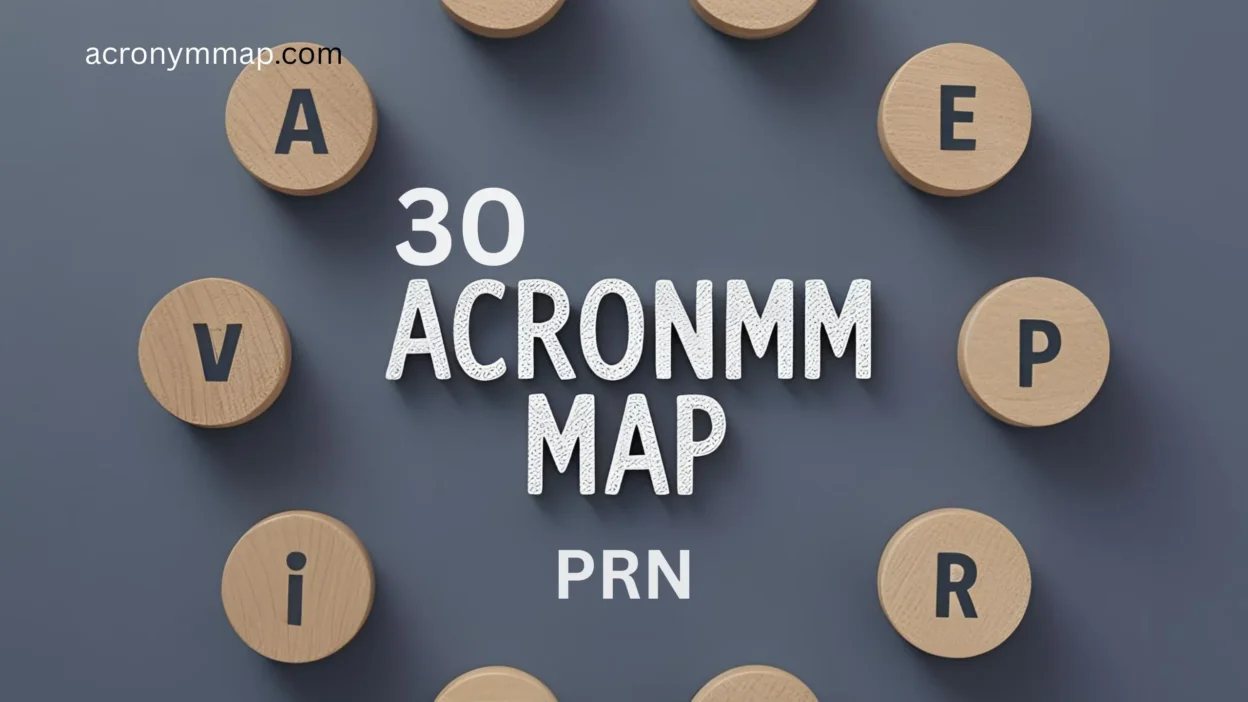When we hear “PRN,” most people immediately think of the medical abbreviation for “pro re nata”, which means “as needed” or “when necessary.” It’s commonly found on prescriptions, allowing patients to take medication only when symptoms arise.
But the concept of PRN goes beyond medicine—it’s about flexibility, situational response, and need-based action.
This opens up a world of expressive vocabulary: words and acronyms that capture the idea of “only when required”, “on-demand”, or “as the situation calls for.” Whether you’re writing in a medical context, describing adaptable people, or emphasizing something temporary or optional, having alternatives to PRN helps communicate with greater precision.
Below are 30 “PRN-style” acronyms or expressions, each with a clear meaning, example sentence, and tips on when to use them.
🔄 30 Alternatives to the “PRN Acronym”
1. As Needed
Meaning: Only when required.
Example: Use the inhaler as needed for shortness of breath.
When to use: Standard in medical and instruction manuals.
2. Ad Hoc
Meaning: Created or done for a specific purpose only.
Example: An ad hoc committee was formed to handle the crisis.
When to use: Ideal for organizational or situational planning.
3. On Demand
Meaning: Instantly available when requested.
Example: Streaming services allow users to watch movies on demand.
When to use: Tech, entertainment, or services context.
4. As Necessary
Meaning: If and when needed.
Example: Adjust the seasoning as necessary while cooking.
When to use: Formal writing or instructions.
5. Situational
Meaning: Depends on the specific situation.
Example: Her leadership style is very situational.
When to use: Psychology, management, or personal traits.
6. On Call
Meaning: Available to work or act when needed.
Example: The surgeon is on call this weekend.
When to use: Medical, emergency, or service professions.
7. Flexible
Meaning: Able to adjust to different conditions.
Example: We have a flexible return policy.
When to use: Business or customer service.
8. Intermittent
Meaning: Occurring irregularly.
Example: He experiences intermittent back pain.
When to use: Health, weather, or event descriptions.
9. Optional
Meaning: Not mandatory; up to the user.
Example: Attendance to the second session is optional.
When to use: When offering choices or freedoms.
10. Occasional
Meaning: Happening now and then.
Example: She enjoys the occasional glass of wine.
When to use: Informal or lifestyle writing.
11. Temporary
Meaning: Not permanent.
Example: This is a temporary solution until we find a permanent fix.
When to use: Problem-solving or planning contexts.
12. Case-by-Case
Meaning: Based on individual circumstances.
Example: Refunds are handled on a case-by-case basis.
When to use: Customer service, HR, or legal language.
13. Short-Term
Meaning: Limited duration.
Example: They hired short-term contractors for the project.
When to use: Time-sensitive planning.
14. As Applicable
Meaning: If it fits or relates.
Example: Complete the sections as applicable to your case.
When to use: Legal, bureaucratic, or formal settings.
15. Conditional
Meaning: Only applies under certain conditions.
Example: The bonus is conditional upon meeting sales targets.
When to use: Contracts, agreements, or negotiations.
16. Sporadic
Meaning: Occurring infrequently and irregularly.
Example: He had sporadic attendance at work.
When to use: Emotional or narrative descriptions.
17. Reactive
Meaning: Responds only after something happens.
Example: The team took a reactive approach to the issue.
When to use: Behavioral or strategic writing.
18. Intervening
Meaning: Acts when necessary to change a situation.
Example: The teacher intervened when the debate got heated.
When to use: Crisis, education, or therapy settings.
19. Contingent
Meaning: Dependent on a specific condition.
Example: The deal is contingent on board approval.
When to use: Business or legal scenarios.
20. Triggered
Meaning: Activated by a specific event.
Example: The alarm is triggered by movement.
When to use: Tech, safety, or psychology.
21. One-Off
Meaning: Done only once or for a single purpose.
Example: That was a one-off appearance.
When to use: Informal, casual tone.
22. Infrequent
Meaning: Rare or not happening often.
Example: His visits became infrequent over time.
When to use: More neutral than “sporadic.”
23. When Required
Meaning: At the moment it’s needed.
Example: Only take the medication when required.
When to use: Instructions or compliance documents.
24. On Rotation
Meaning: Alternating between scheduled times.
Example: They are on rotation for weekend shifts.
When to use: Work, logistics, or scheduling.
25. Spare-Time
Meaning: Done during free time.
Example: He builds models in his spare time.
When to use: Lifestyle or hobby writing.
26. Impromptu
Meaning: Done without planning.
Example: They had an impromptu meeting at the café.
When to use: Creative or casual settings.
27. Provisional
Meaning: Temporary and subject to change.
Example: She was given provisional clearance.
When to use: Formal or procedural contexts.
28. Back-up
Meaning: Ready to step in if needed.
Example: We have a back-up generator.
When to use: Contingency or redundancy planning.
29. Event-Driven
Meaning: Actions depend on events occurring.
Example: Their marketing is event-driven, not calendar-based.
When to use: Business, tech, or software writing.
30. Discretionary
Meaning: Based on personal or situational choice.
Example: He made a discretionary donation to the cause.
When to use: Financial or policy-related language.
🎯 How to Choose the Right Word
Here’s how to select the most fitting PRN-style synonym for your purpose:
- Medical or technical usage: Stick with “as needed”, “PRN”, or “when required.”
- Business and planning: Use “contingent”, “ad hoc”, “provisional”, or “on call.”
- Casual or lifestyle contexts: Go for “occasional”, “spare-time”, or “impromptu.”
- Formal/legal tone: “Conditional”, “discretionary”, and “as applicable” are best.
- Emotional nuance: Words like “sporadic”, “intermittent”, and “infrequent” carry mood and time implications.
🧭 Final Thoughts
The concept of PRN reflects one of life’s most practical ideas: not everything needs to be constant. Whether it’s medication, actions, emotions, or decisions, many things work best only when needed.
Understanding and using the right synonyms or acronyms for this concept allows you to communicate clearly—whether you’re writing professionally, creatively, or casually. So next time you feel the urge to say “PRN,” consider whether “ad hoc,” “contingent,” or even “impromptu” fits your tone better.

